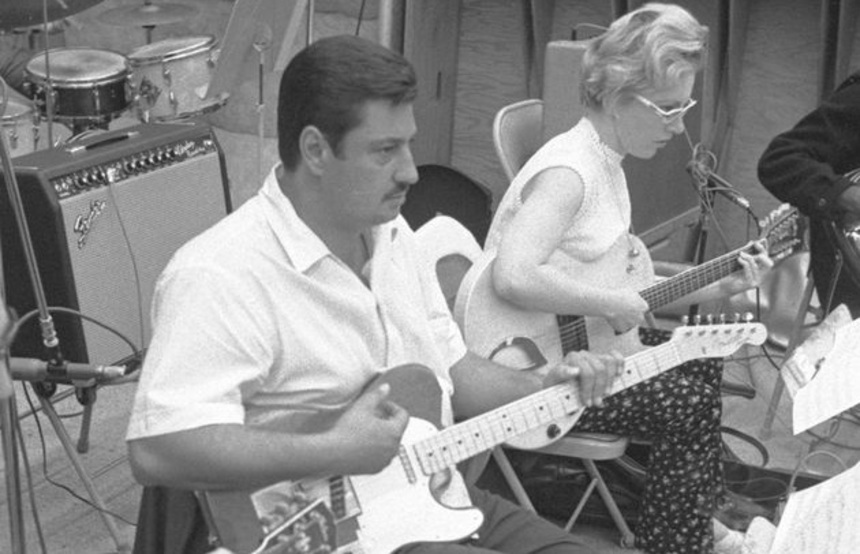Review: THE WRECKING CREW, Musical Passion Is Always Present

The 1960s gave rise to a new kind of pop music, running the gamut from blues-infused rock 'n' roll, jazz-laced funky soul and dance music, to string-drenched mini-symphonies coming (mostly) out of California studios. The landscape then was a slew of independent studios, with each providing its own constellation of stars and musicians that helped shaped that regional sound.
In Detroit, the Funk Brothers assembled under Motown's extraordinary slate of songwriters and producers, crafting what they dubbed the sound of young America in a studio they dubbed the Snakepit. Down south in Memphis, a core group called Booker T and the MGs or the Mar-Keys gave Stax its more raw sound, while down in Alabama a series of bands including the Swampers helped make tiny Muscle Shoals an international destination for recording artists.
The Wrecking Crew was the collection that helped make Phil Spector's Wall of Sound so epic, gave rise to the highlights of Brian Wilson's genius, and provided the backing track for thousands of records, jingles, soundtracks and theme songs. As California became during this period the true mecca for the entertainment industry, this core group of musicians formed a unit that would for many years define the musical landscape.
For fans of this era, names like Hal Blaine, Earl Palmer, Jim Keltner, James Burton, Larry Knechtel, Jack Nitzche and Carol Kaye are as crucial to the enjoyment of these often wonderous songs as those whose names were on the label, be they bubble gum acts like the Monkees or the Archies, slick productions like those by the Carpenters or the 5th Dimension, surf pop by the Beach Boys, or the stunning folk-rock of Simon & Garfunkel. Then there are names like Leon Russell and Glenn Campbell that saw their fame grow after their time hacking away on tune after tune with their crew of fellow session players.
One of the core members of the group was the guitarist Tommy Tedesco, a name not exactly resonating in many households, but like James Jamerson at Motown, or Steve Cropper down in Memphis, his vast musical contribution is immediately recognizable to almost anyone from the last several generations.
A film project some decades in the making, in The Wrecking Crew Tommy's son Denny has tried to capture both the spirit of his father's work and to present for contemporary audiences the context in which this music was made. With a mix of various digital and film stocks, talking-head interviews, musical interludes and vintage documentary footage, Denny does an admirable if somewhat scattershot job at telling this tale.
By its very nature, the Wrecking Crew was a disparate lot, and the film suffers from a similar lack of specificity. There was a lot going on at the time, and focusing on a core group (as Denny does early in the film) may have made for a slightly more accessible (and enjoyable) film. There's plenty here to gush over, including some goosebump worthy scenes with Kay plucking her bass to a Beach Boys backing track, or, a personal highlight, hearing the bass lick by Maz Bennett that he used on the 5th Dimension's take on "Let the Sunshine In" from Hair.
In short, there's some serious musical nerdiness here, and from players to fans alike there's a tonne to admire. Unfortunately, the film is hampered by its very scope. In contrast to films such as Standing in the Shadows of Motown , Muscle Shoals or even the Oscar winning 20 Feet From Stardom, it's the filmmaking, not the participants, that lets the work down. At times the interviews feel dry and repetitive, at others it feels that critical material is skipped over. This is a herculean task to properly document the period, and these guys easily could have been the subject of a mini-series rather than a theatrical doc. In trying to give everyone a voice it ends up seeming like no one really gets the time they deserve. One perfect example of this is an extremely brief appearance late in the film by Frank Zappa talking about Tedesco's playing; yes, this Zappaphile would have wanted more of him for personal reasons, but as a film it could have used much more from the likes of someone so eloquent about that period of recording and songwriting.
In the end, The Wrecking Crew doesn't really work as a film but acts as a series of moments. Some clips on their own are nothing short of astonishing, but in their assembled form come off a jumbled mess. There's not a moment that Tedesco's passion isn't present here, and it's clear this project that literally has taken decades is a work of immense effort and strain. thoughts of gaining music clearances alone makes one shake their head in empathy.
The Wrecking Crew is a vital part of the narrative of the golden age of popular music recording, and contains elements that will certainly be used for future, perhaps more sophisticated tellings of this period. As it stands, there's plenty to love and admire here, both of the stories told and the songs heard, but it's hampered unfortunately by a clunky and dull narrative structure that neglects to inject the spark that truly great music docs manage to do. More admirable than accomplished, Tedesco is to be congratulated on finishing his task. I's a fine tribute to his father's collaborators, and despite the bumpy execution it's a film well worth seeking out.
The film will open in select theaters in the U.S. on Friday, March 13, and will also be available to watch via various Video On Demand platforms.







